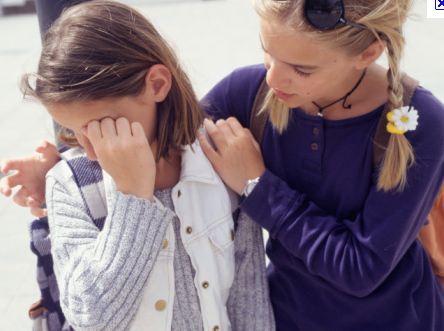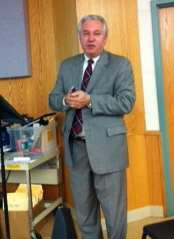Fostering Empathy at Scarsdale Middle School
- Category: Schools
- Published: Thursday, 27 October 2011 07:43
 Middle School can be scary. It is a giant pool of hormones, ever-shifting cliques and preferences, mean girls, backstabbers, wimpy kids and jocks. I think I threw away every picture I had of myself from this age (acne, perm, Z.Cavaricci pants, I shudder at the thought) just to escape those memories. Scarsdale Middle School principal Michael McDermott and his staff are working hard to make the lives of the students at his school far better than many of our middle school years, with a focus on empathy.
Middle School can be scary. It is a giant pool of hormones, ever-shifting cliques and preferences, mean girls, backstabbers, wimpy kids and jocks. I think I threw away every picture I had of myself from this age (acne, perm, Z.Cavaricci pants, I shudder at the thought) just to escape those memories. Scarsdale Middle School principal Michael McDermott and his staff are working hard to make the lives of the students at his school far better than many of our middle school years, with a focus on empathy.
On Tuesday night, at Scarsdale Middle School’s PTA meeting, Mr. McDermott delivered his presentation: The Roots of Empathy: One School’s Story. He describes what it’s like to change the school’s mindset, create new programs and reshape the existing curriculum to create a more empathetic community.
In his dynamic presentation which had video clips, animation and music (inspired by Steve Jobs, according to McDermott), the principal explained that as humans we are wired to experience what others experience and as a society we have a drive to belong. “Developing empathy is like giving your school a heart transplant,” he says.
As adults we can all agree that the need to relate and belong is very much a part of the human condition, but seeing that translate in a middle school cafeteria is a very different thing. McDermott has observed this as an educator as well. He spoke of changing social norms -- where it was once the norm for kids to look away and comply with a bully -- now it’s the norm to treat others with respect and to speak up if someone is being intimidated. He highlighted class projects that helped the elderly and people with disabilities that allowed students to be empathetic to people who they normally wouldn’t speak to or think about. He showed videos students took where they examined themselves in the context of the world. For a 12 or 13-year-old who thinks he or she is the center of the universe, this is pretty earth shattering stuff.
Keeping it Local:
“We can’t be talking about saving Darfur one day and isolating each other in the lunchroom the next,” explains McDermott in his presentation.

The most striking part of McDermott’s presentation was a video of an interview with Dori Rosamond, the Special Class teacher at the middle school. Dori described how many of her students often felt segregated from the rest of the school and apart from the community. She spoke of how her some of her students would look down and avoid eye contact while walking the hallways. But through this focus on empathy, her class joined with high school volunteers and the kids began to open up, feel more confident and make friends outside the confines of her classroom. She also spoke of how the student volunteers also benefited from this program as several of them are siblings to autistic children. It was touching and inspiring.
What You Can Do:
As parents we can do a lot to create empathy in our children. Of course we know the basics, talking about feelings, creating a culture and a home environment that’s caring and respectful and having compassion for others. But there are things that I think many of us (ok, me and maybe you) do that perhaps can be changed or improved.
Praise publicly, correct privately: I’m pretty good about the first part, praising my child or even her friend about doing something great always feels good. That’s a no-brainer. On my best days, though, I will take my daughter aside or talk about behavior that wasn’t so great in private and talk about how situations could have been handled better. That said, I think more than enough parents have heard me say in not the quietest of voices “Are you kidding me?” to my daughter on the playground over some infraction. I have to work on that.
Yelling: If you create an atmosphere of yelling and tension or intimidation your kid is more likely to be a bully. I think most people know this. I think most people don’t want to yell at their kids. But long days, frayed nerves and bad or repeatedly bratty behavior will cause voices to rise. McDermott seems understanding of that. But if your goal is to raise a kind, empathetic child with a decent amount of self-esteem, think before you shriek.
Even in Jest: McDermott says that often when he praises a student to his parents, a parent will often joke ‘Him? Really?’ Now everyone gets humor and false modesty and gentle teasing, even kids. But he makes a good point. When your kid is getting praise, especially about good behavior, why minimize it? If there was ever a time to beam with pride and take a compliment, this would be it. You are also labeling your kid as bad. Boo. Don’t do that.
Speaking of Labels:
In an era when the phrase zero-tolerance, especially when it comes to bullying, appears to be the smart and pro-active thing to do, leave it to Scarsdale to go in the other direction. McDermott says that those types of policies really label one group of kids as ‘bad’, and one could argue another group as ‘victims’.
We know that tween and teen behavior can be unpredictable. But labels stick. A sure-fire way to get a kid to continue cause bad behavior is to label him bad. And with a zero-tolerance policy, there is no chance for redemption. If we can’t allow a 12 or 13 years old to redeem him or herself, then we may have missed the whole point of empathy.
We can’t really believe that everything is sunshine and rainbows at Scarsdale Middle School. That age is tough and I think we’d be naïve to say things are always easy for kids around here, but I think McDermott and his staff are doing their best to change minds and attitudes at the school and their work should be commended.
 This article was written by Jen Geller with input from Judy Stanley
This article was written by Jen Geller with input from Judy Stanley
Jen is a freelance journalist who has covered the economy and markets for over a decade at a major financial news outlet. She lives in Scarsdale with her husband and 2 children. Jen has yet to bake a successful batch of cookies.
---------------------------------------------------------------------------------------------------------------------------------------------------
Drug and Alcohol Task Force November Factoid
Real kids are curious about alcohol. 40% have tried it by the time they reach eighth grade. Talking with your children early and often can make a difference. Get the facts, the tools, and the advice you need to start talking real at http://underagedrinking.samhsa.gov/
The Scarsdale Task Force on Drugs and Alcohol encourages you to start the conversation with your kids now. Please visit our website and sign up for our email alerts at www.scarsdaleschools.org/datf






